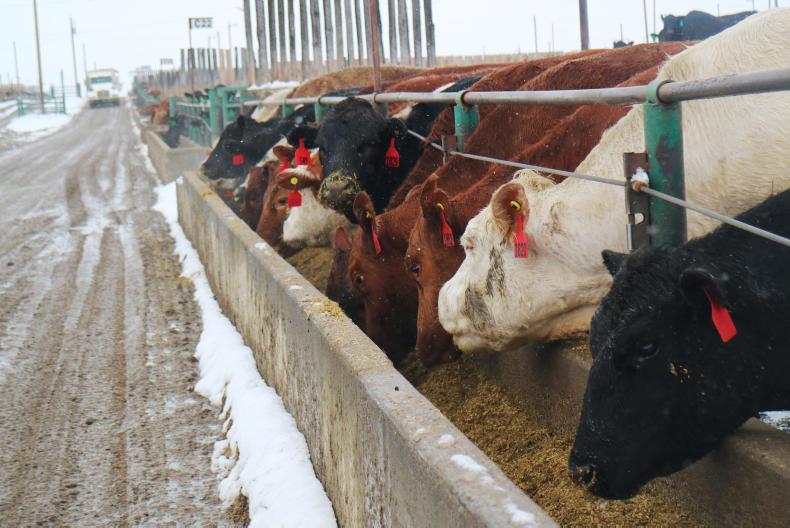The digestive system in cattle works by fermenting feed. During this process, methane is produced as a byproduct and released into the atmosphere.
However, the production and release of methane has two negative impacts. Firstly, it represents a loss of energy to the animal of approximately 2% to 12% of the gross energy intake. As well as this, methane is a potent greenhouse gas which, when released in the atmosphere, has a global warming potential 28 times greater than CO2.
Livestock emissions
It is estimated that greenhouse gas emissions from livestock production represent 14.5% of all global emissions created by human activity. About 44% of this total is in the form of methane. Furthermore, beef production contributes to 41% of livestock sector emissions.
A compound called 3-nitrooxypropanol (NOP) acts as an enzyme inhibitor during the last step of methane production. In other words, NOP is said to reduce methane emissions in ruminants.
Huge reduction
Research has found NOP to reduce methane levels by a range of 6.7% to 59.6%, depending on the mode of provision to the animal.
In 2016, the University of Alberta published a paper outlining results from a trial where NOP was offered via feed to feedlot cattle.
The trial
For the trial, a group of eight mature Angus heifers were fed daily with a mixed ration consisting of 60% barley silage, 35% barley grain and 5% vitamin and mineral supplement prepared daily using a feed mixer. These animals were also housed in a heated research barn in individual tie-stalls fitted with rubber mats and bedded with wood shavings. The heifers were exercised for one and a half hours each day, except when they were in the metabolic chambers.
The experiment was then designed with two treatments: a control treatment and an NOP treatment.
The duration of the trial was 146 days and animals were treated with levels of 0.5, 1.4 and 2.8g of NOP each day at different intervals throughout the trial as well as being subject to an 18-day commencement period and a 16-day recovery period without NOP.
Results
Animal performance was unaffected by the inclusion of NOP in the diet (Table 1). When NOP was offered, daily methane produced per animal was reduced by 59.2% and gross energy loss was reduced by 61.2% (Table 1). NOP did not affect CO2 production.

In a society increasingly concerned with the greenhouse effect and climate change, the results here are significant and have the potential to address the issue of livestock methane emissions in commercial feedlot settings.
Read more
Editorial: all credible views should be considered in climate-change debate
Full coverage: agriculture and climate change
The digestive system in cattle works by fermenting feed. During this process, methane is produced as a byproduct and released into the atmosphere.
However, the production and release of methane has two negative impacts. Firstly, it represents a loss of energy to the animal of approximately 2% to 12% of the gross energy intake. As well as this, methane is a potent greenhouse gas which, when released in the atmosphere, has a global warming potential 28 times greater than CO2.
Livestock emissions
It is estimated that greenhouse gas emissions from livestock production represent 14.5% of all global emissions created by human activity. About 44% of this total is in the form of methane. Furthermore, beef production contributes to 41% of livestock sector emissions.
A compound called 3-nitrooxypropanol (NOP) acts as an enzyme inhibitor during the last step of methane production. In other words, NOP is said to reduce methane emissions in ruminants.
Huge reduction
Research has found NOP to reduce methane levels by a range of 6.7% to 59.6%, depending on the mode of provision to the animal.
In 2016, the University of Alberta published a paper outlining results from a trial where NOP was offered via feed to feedlot cattle.
The trial
For the trial, a group of eight mature Angus heifers were fed daily with a mixed ration consisting of 60% barley silage, 35% barley grain and 5% vitamin and mineral supplement prepared daily using a feed mixer. These animals were also housed in a heated research barn in individual tie-stalls fitted with rubber mats and bedded with wood shavings. The heifers were exercised for one and a half hours each day, except when they were in the metabolic chambers.
The experiment was then designed with two treatments: a control treatment and an NOP treatment.
The duration of the trial was 146 days and animals were treated with levels of 0.5, 1.4 and 2.8g of NOP each day at different intervals throughout the trial as well as being subject to an 18-day commencement period and a 16-day recovery period without NOP.
Results
Animal performance was unaffected by the inclusion of NOP in the diet (Table 1). When NOP was offered, daily methane produced per animal was reduced by 59.2% and gross energy loss was reduced by 61.2% (Table 1). NOP did not affect CO2 production.

In a society increasingly concerned with the greenhouse effect and climate change, the results here are significant and have the potential to address the issue of livestock methane emissions in commercial feedlot settings.
Read more
Editorial: all credible views should be considered in climate-change debate
Full coverage: agriculture and climate change







 This is a subscriber-only article
This is a subscriber-only article





SHARING OPTIONS: